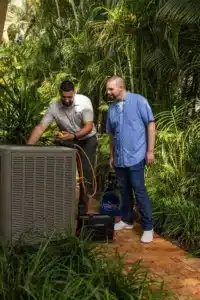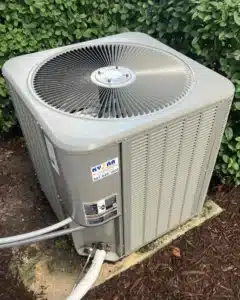Do Central Air Conditioners Recirculate Air or Bring in Fresh Air?
Many homeowners assume that central air conditioners pull fresh air...
Air conditioners create cool and comfortable environments within our homes, offices, and other buildings when it’s too hot outside. Though you may want to set the temperature as low as possible in very hot weather, it is important to maintain the standard indoor temperature of 70 degrees Fahrenheit for a variety of reasons.
If your air conditioner temperature is too low, this can have negative consequences that ultimately end up costing you in the form of medical bills and system repairs. Temperatures that are too low can:
Affect Your Health: Health issues can result from setting the air conditioner below 70 degrees. Our bodies can go into shock if the temperature in a room drops below a certain point. Our bodies are made to keep a certain internal temperature, and if the temperature outside suddenly drops, we can get sick. This is especially true for people who are elderly, have young children, and have chronic illnesses.
Impact Your Breathing: Respiratory issues can occur when the air conditioner is set too low. It can be difficult to breathe when the air is too cold because it can irritate the lungs, nose, and throat. This can be particularly harmful because cold air can aggravate illnesses such as asthma or allergies.
Harm the Environment: Air conditioners use a lot of energy, and they use more energy when the temperature is lower. As a result, lowering the temperature of your air conditioner below 70 degrees can have a significant impact on your electricity bill and the environment. What’s more, the refrigerant used in cooling units can be harmful to the climate, so smaller amounts are more efficient.
Cause Damage to the Unit: The purpose of an air conditioner is to function within a predetermined temperature range. At the point when you set the temperature too low, the unit needs to work harder than it was intended to, which can make it separate all the more rapidly. As a result, you might have to buy a new one more often, which can be expensive.
When hot weather comes around, it’s important to find a temperature that’s comfortable for you without being too low. However, to avoid the negative effects of turning your air conditioner too low, it’s important to check with a professional air conditioning service provider. A professional company will be able to help you maintain the right temperature based on the size of your space and the type of system you have.
Kyzar Air Conditioning is a state-licensed, family-run business in Palm Beach & Martin County, Florida. Operating since 2005, we are experts in air conditioning installation, maintenance, and repairs. We can help you get the most out of your air conditioning unit with our 24/7 emergency service and reliable maintenance solutions.
Call 561-640-1000 to learn more about our 5-star services.
Disclaimer: All content on this website is intended for informational purposes only. We discourage anyone from attempting to repair, replace, or maintain HVAC systems without the help of a licensed, insured HVAC technician.

Many homeowners assume that central air conditioners pull fresh air...

Preventive AC maintenance plays a major role in keeping cooling...

Choosing the right air conditioning system for your home is...

Indoor air quality is a critical factor in maintaining a...

Maintaining clean and healthy indoor air is increasingly important, especially...

Maintaining the right level of humidity in your home can...